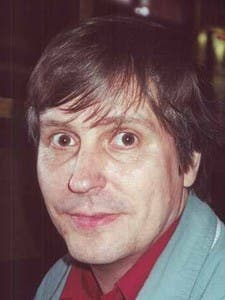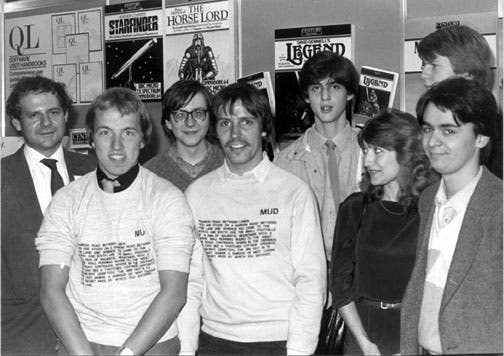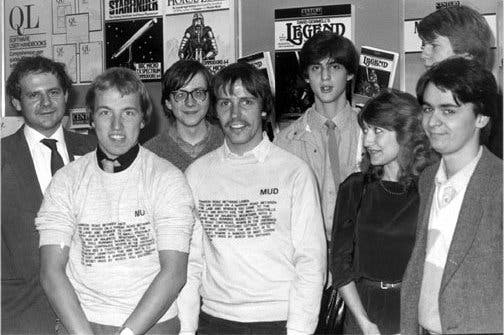The man who made a game to change the world
"Every MMO is a political statement. I should know: I designed them that way."
There is no one agreed family tree of video games, arranged and pruned by consensus. There is no single progenitor that sits at the top of that tree, the seed from which all other video games originate.
The video-game family tree is knotted, tangled and grimly contested. We can all agree that Donkey Kong begat Super Mario Bros. But did the modern role playing games flow from Adventure, Wizardry or Black Onyx? Historians can't even agree on who first put a game onto a computer. There were, rather, multiple, dispersed inventors, people who eureka'd in darkened bellies of universities, where the comically large mainframe computers of the mid-20th century hummed with potential and electrical warmth.
One branch of the family tree, however, is different. This lineage is ordered and unchallenged. The modern MMO, those vast, complex online worlds where players can socialise and quest together, can be cleanly traced back through Wildstar, World of Warcraft, Everquest and all the way back to MUD, the primordial earth from which almost all virtual worlds sprouted. Richard Bartle, the 54-year-old co-creator of the game is unequivocal. "There is obviously a difference in style, but nevertheless, in the same way that the latest 3D movie today is fundamentally the same thing as a Charlie Chaplin short, so today's MMOs are MUDs," he says.
It's not necessarily because MUD, which stands for 'multi-user dungeon' was the first game in which players could quest and socialise together over a network so much as it was the most prevalent. "The reason you're talking to me and not, say, Alan Klietz [who made Sceptre of Goth] is because we gave the code away for free," says Bartle. "When the commercial guys came along looking to hire people who knew how to make an MMO, there were a hundred times more people familiar with MUD rather than any of the alternatives."
Bartle gave the game away not to get famous and not to get rich. He did it because, in this virtual world, he saw a better blueprint for society. MUD was a place in which players were able to succeed according to their actions and intelligence rather than an accident of birth into a certain social class or fortune. "We wanted the things that were in MUD to be reflected in the real world," he says. "I wanted to change the world. MUD and every subsequent MMO that has adopted its designs are a political statement. I should know: I designed it that way. And if you want the world to change, then making people pay to read your message isn't going to work. So we gave it away."
***
Bartle grew up in the 1960s on a council estate in Hornsea, Yorkshire. His father was a gas fitter and his mother a school cook at a time in Britain when a person's class defined their prospects. The Bartles, in short, were a working class family with working class prospects. After his mother wrote some short children's stories she sent them to a book publisher. The stories were published, scene for scene, but attributed not to his mother but to a well-known children's author at the time. She was given no credit or remuneration. Mrs Bartle no doubt felt the sting of injustice (she kept her original manuscripts and showed them to her son) but she was also resigned to the fact that she was a school cook and should be thankful for her place in life. She accepted that her class, in other words, defined her prospects and there was no moving up or on.

Stories and games were prevalent in the Bartle household - as well as his mother's literary ambition, his father was an avid player of boardgames. "I invented role-playing games when I was about 12," Bartle says, eyes gleaming. "I'd stick pieces of paper together and draw a huge map on them. I'd design the world with lakes and mountains. I put various native tribes in the world and I invented a character who had to get from one side of the map to the other." Bartle named the game after this lead character, Dr Toddystone. The name was a play on the Victorian explorer Dr Livingstone and the word 'Toddy', British slang in the early 1970s for dog shit. "I thought the game was going to be dog shit so I named it that," he says. "It was an RPG by any measure. I built a diary up of the events that happened in the game: Toddystone having to barter for a horse, being caught in an eclipse and so on. It was... vivid."
When he was sixteen Bartle saw his first computer. "BP opened a chemical works nearby and, as a way to improve relations with the local community, they donated computers for local schools," he says. Bartle's school was given access to a DEC System 10 mainframe. He immediately knew that he wanted to write a game. At that time would-be programmers would write their code out by hand. This would then be sent off to an administrator who would type it into the computer. It would take two weeks to find out if there were any bugs.
"It was a political endeavour from the start, as well as an artistic one"
Bartle's first game featured battling tanks, which could be moved around the map by entering co-ordinates into the computer. The DEC-10 would then print out a map, using dots to denote the landscape and bracket symbols to show the tank's whereabouts. "We weren't aware of Space War or any of the other games that had been written around the world at that point," he says. "But likewise it never occurred to us that people hadn't really written computer games before. We didn't know what they were but we just assumed computer games were out there."
For Bartle, his goal was simple: find a way to get to university. "Nobody in my family had ever gone before so it would have made my parents proud," he says. Bartle was accepted into Essex University ("mainly on flair") and studied mathematics in his first year along with computer science and physics. "At the end of the first year there were two students who were better than me at maths and no students better than me at computer science so I switched course entirely. I already had a sense of the injustice of the education system but when I got to university it became clear: the other students were just as smart at the kids had been in my school. These students had simply been better taught and better prepped for exams than those in my previous school."
Bartle had the chance to recast these unjust systems when, in his first year of study, he met Nigel Roberts, president of the university's computer society. Roberts then introduced Bartle to Roy Trubshaw, a student in the year above Bartle who, earlier that week, had written the first proof of concept for MUD. "He called it Multi User Dungeon because he wanted to give people a sense of what kind of game it was going to be. Nowadays we call them 'Adventure' games, but he also thought 'Dungeon' would become the genre's name." With his prototype Trubshaw had discovered a way to design a game on the DEC that could be shared between multiple users. The pair, assisted by Roberts, expanded the prototype. The total amount of memory available was, at the weekends, just 70k - less than the file size of a photograph taken on a mobile phone today.

By Christmas 1978 MUD was playable. Players would sit at a teletype (a device similar to a typewriter that accessed the mainframe) and type in commands. There was no screen; details about the world and everyone's actions within were instead printed out on paper. By the following year the machine code had become "too unwieldy" to add new things. "We threw it away and rewrote everything in Basic Combined Programming Language, a forerunner to C," says Bartle. "Most of the game was complete by spring 1980, but Roy's finals were coming so he passed code ownership to me.
"Roy was mainly interested in programming, with a mild interest in game design," says Bartle. "I was the reverse: a slower programmer but sharper with design, so we complemented one another. I added experience points and the idea that player character's could 'level up' and improve their attributes through accomplishments and so on." Originally the pair had wanted goals in the game to derive from players themselves. "But when you're working on something with less computational power than a washing machine, you can't really do that," he says. "We had to author gameplay, when originally we had hoped it would be totally emergent."
By this point, Bartle had become clear in his broader vision for the game. "We thought the real world sucked," he says, with the undiminished righteous anger of the lifelong revolutionary. "The only reason I had been allowed into a university is because the country decided that it was so in need of programmers that it was prepared to tolerate people from backgrounds like mine and Roy's in further education. We both railed against that. We wanted to make a world, which was better than that. It was a political endeavour right from the start, as well as an artistic one."
Those political aims manifested in the game through the use of levels and character classes, affording players the freedoms that hadn't been afforded to Bartle, or, at least, to his parents. "We wanted game to be pure freedom, to allow people to be themselves," he says. "We introduced character classes and levels because I wanted people to have some indication of their own personal merit, based on what they did, rather than where they were born. It's why I'm not a fan of free-to-play games in which you can simply buy progress. That's a complete contravention of what we were trying to do with MUD. We were creating a true meritocracy. Not because I thought a meritocracy was the one true way, but that if we were going to have a system in which people ranked themselves, then a meritocracy was the least-worst approach."
Bartle excelled in his studies, graduating from Essex with the "highest first recorded at the time" and, as a result, was given the university's solitary PhD grant. MUD spread quickly. "Due to an accident of geography, Essex University was near to a BT research centre at Martlesham Heath," he explains. "We had access to Experimental Packet Switching Service, through which we could connect to the university of Kent. Through that we could connect to ARPA, the forerunner to the internet. In this way, we could play MUD with, say, people from The Massachusetts Institute of Technology. In fact, the head of the MIT media lab was one of the first people to play."
Students at universities around the country and world began to create their own versions of MUD, each with their own idiosyncrasies and stories. "There were around twenty different games by 1989," says Bartle. "The most influential was AberMUD, named after its birthplace, the University of Aberystwyth and created by Alan Cox, who went on to become one of the co-developers of Linux. Cox made a version that was playable on Linux and sent it to someone in America. It spread like a virus." On the MMO family tree, AberMUD sits above World of Warcraft.
While, during the 1980s, most of the MUD games were similar, in 1989 they began to diverge with the release of TinyMUD, a version which stripped out all of the gameplay and was instead a virtual world orientated entirely around socialising. "You could move around and explore, like in Second Life," says Bartle. "People went in there and built things, had virtual sex and so on." Another group of developers reacted against this and started making MUDs that emphasised questing over socialising. "This made a kind of schism between social virtual worlds, and very game-focused games," says Bartle. "Both of these branches became distinct. It's the same difference in approach that you see between Alice in Wonderland and Dorothy in Oz. Alice explores and socialises; Dorothy tries to get home."

Perceiving the different ways in which players approached the game led Bartle to consider whether MMO players could be classified according to type. "A group of admins was having an argument about what people wanted out of a MUD in about 1990," he recalls. "This began a 200-long email chain over a period of six months. Eventually I went through everybody's answers and categorised them. I discovered there were four types of MMO player. I published some short versions of them then, when the journal of MUD research came out I wrote it up as a paper."
The so-called Bartle test, which classifies MMO players as Achievers, Explorers, Socialisers or Killers (or a mixture thereof) according to their play-style remains in widespread use today. Bartle believes that you need a healthy mix of all dominant types in order to maintain a successful MMO ecosystem. "If you have a game full of Achievers (players for whom advancement through a game is the primary goal) the people who arrive at the bottom level won't continue to play because everyone is better than them," he explains. "This removes the bottom tier and, over time, all of the bottom tiers leave through irritation. But if you have Socialisers in the mix they don't care about levelling up and all of that. So the lowest Achievers can look down on the Socialisers and the Socialisers don't care. If you're just making the game for Achievers it will corrode from the bottom. All MMOs have this insulating layer, even if the developers don't understand why it's there."
"There's so much you can do with virtual worlds. But it's not being done"
Bartle continues to work at Essex University, offering consultancy on some MMO projects in his spare time. Trubshaw left the video game industry to design systems for air traffic controllers. Neither man became rich through their game and Bartle believes that he's even less known in his home nation that in America (where, in 2005 he was awarded with the Pioneer award at the Game Developers Choice Award).
"Had I been the kind of person who was doing it for monetary gain I wouldn't have been the person to give the code away," he says. "Sure, it would be nice if someone who had made a few millions from our ideas came along to give Roy and I some of their winnings. But, when it comes to changing the world, I think we have been successful, to a certain degree. We've shown that virtual worlds can affect the real world. There is progress."
But that progress is, for Bartle, too slow. "I am frustrated at its slow pace," he says. "There's so much you can do with virtual worlds. But it's not being done. I wanted them to be places of wonder in which people could go to truly be themselves, away from societal pressure or judgement. My idea was that if you could truly find yourself in a virtual world you might be able to then take that back into the real world. Then we could get rid of these artificial restraints of class, gender, social status and so on that dictate that you are what you are born to be."
It is a motivating grievance that Bartle, despite his success, despite his life's defiance of class, hasn't discarded. He still believes in the MUD's utopian vision of freedom from inequality and circumstance. The MMO, as it currently stands, may not represent the full blooming of his original seed. But he remains hopeful that these virtual worlds can offer a new way for reality to follow. "I haven't given up," he says. "I want to see the world change before I die."

